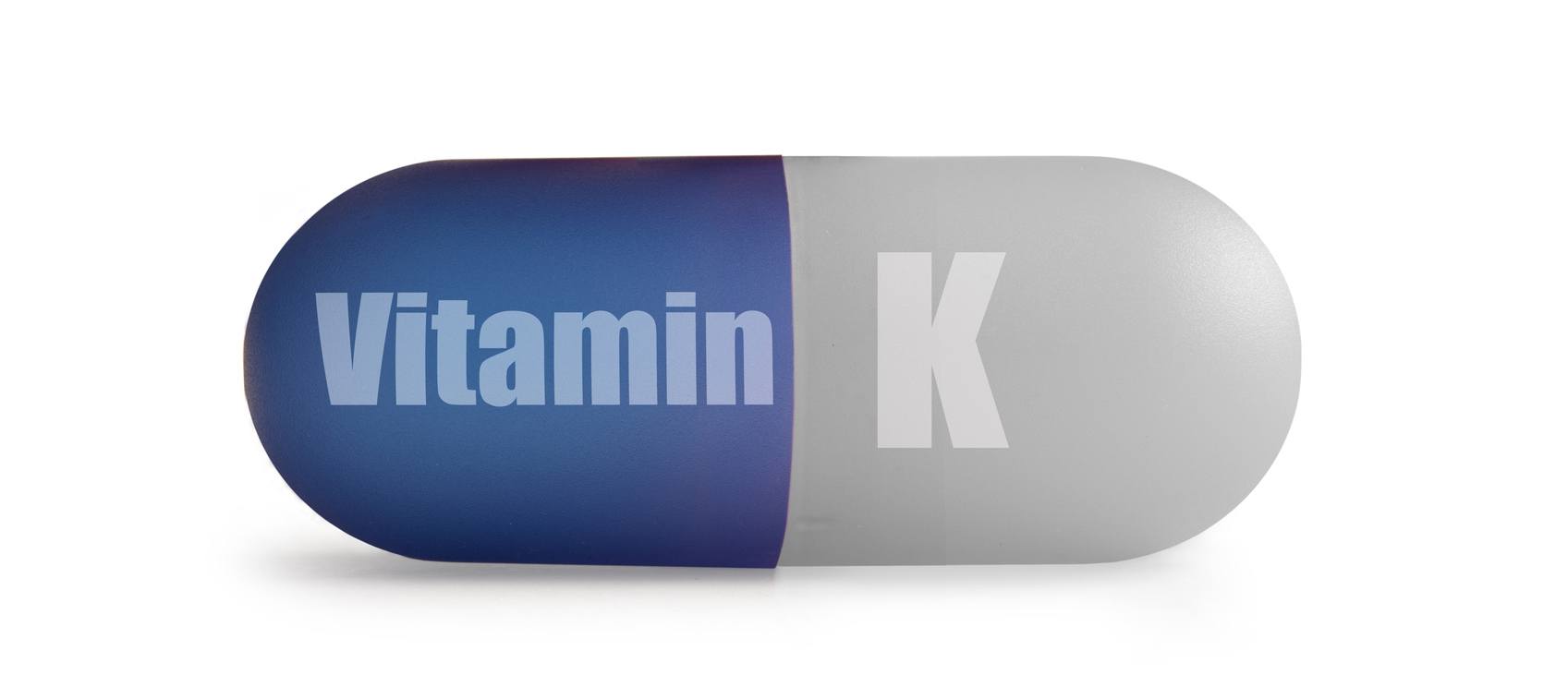
For years, the vitamin K supplement has been the neglected stepchild in the world of nutrition. There’s not even an RDA for this essential nutrient, simply an “adequate intake” (AI) based on the average dietary intake (90 mcg for women and 120 mcg for men). Although this paltry amount is enough to ensure normal blood clotting, vitamin K is no one-trick pony. It also strengthens the bones, reduces arterial calcification and stiffening, and protects against osteoporosis and cardiovascular disease.
K Is for Coagulation
Vitamin K was discovered by Danish scientist Henrick Dam—winner of the 1942 Nobel Prize—who observed that chicks fed a fat-free diet developed hemorrhages and slow blood clotting. He went on to prove that there was some substance in fat required for coagulation, and because his initial research was published in a German medical journal, it was identified as Koagulationsvitamin, or vitamin K.
That substance turned out to be a group of fat-soluble vitamins with two main members: K1 and K2. K1 (phylloquinone) is found in leafy greens, broccoli, and other vegetables, and in small amounts in vegetable oils. Vitamin K2 (menaquinone, further classified by subtypes MK-2 through MK-14) is present mostly in fermented foods but also in meat, eggs, and dairy. K2 is synthesized by bacteria in the gut as well, but little of it can be utilized by the body.
Vitamin K is required for the structural modification of an important domain of proteins called gamma-carboxyglutamate (Gla) proteins. In order to be activated and function properly, Gla proteins must first bind to calcium ions, and they can only do this in the presence of vitamin K. The best-studied Gla proteins are those that are involved in coagulation.
However, at least 10 additional vitamin K-dependent proteins have also been discovered.
Beyond Coagulation
One of them is osteocalcin. Produced by bonebuilding cells called osteoblasts, osteocalcin helps direct calcium into the bones where it promotes mineralization. It should come as no surprise that a low vitamin K intake is linked with reduced bone mineral density and increased risk of fracture, or that supplementing with K strengthens bone and reduces fractures. In Japan, high-dose vitamin K2 (MK-4) is actually prescribed by doctors for the prevention and treatment of osteoporosis.
Osteocalcin may also play a role in type 2 diabetes. Recent research suggests that this Gla protein has hormone-like actions that signal the release of insulin in the pancreas and adiponectin in the fat cells, and small clinical trials suggest that supplemental vitamin K increases insulin sensitivity and glucose tolerance.
Matrix Gla protein (MGP) is another important vitamin K-dependent protein. MGP is synthesized in the walls of the blood vessels, but rather than encouraging calcium entry as osteocalcin does in the bones, it discourages calcium from being deposited in these soft tissues. This is critical because excess calcium buildup results in calcification and stiffening of the arteries, which reduces their elasticity and responsiveness and is a risk factor for heart disease, stroke, and aortic valve stenosis.
Population studies link a robust dietary intake of vitamin K2 with reduced vascular calcification and cardiovascular risk. Supplements can help as well. In one study, dutch researchers gave a group of postmenopausal women 180 mcg of vitamin K2 (MK-7) or placebo supplements daily for three years. Carotid artery stiffness was retested annually, and at the study’s conclusion, the group taking vitamin K2 had a statistically significant decrease in arterial stiffness, while the placebo group had an increase.
Greens, Cheese, and Supplements
Because leafy greens, broccoli, and fermented foods are the best dietary sources of vitamin K, it’s easy to see why most Americans don’t get optimal amounts of this important nutrient. But it doesn’t take much to increase levels. A cup of chopped raw kale contains 472 mcg of vitamin K1, cooked spinach 888 mcg, and cooked broccoli 220 mcg.
We get considerably less K2 in foods, but it is more bioavailable and remains active in the body for longer periods. The most abundant source is natto, a fermented soybean product popular in Japan. Natto is an acquired taste, but most people do like cheese, and researchers from Tufts University recently found that some types contain decent amounts of K2. The highest levels, in descending order, are in soft (brie, camembert), blue and gorgonzola, semi-soft (jack, gouda, Havarti), and hard (cheddar, parmesan) cheeses. Reduced fat and non-fermented processed cheeses have considerably less vitamin K. Cheese is no longer
the nutritional no-no it once was, so feel free to eat a few ounces a day—along with your kale and broccoli.
For extra protection, make vitamin K2 part of your daily supplement program. Some, though not all, multivitamins contain vitamin K, almost always the K1 form. Although K1 is essential for blood clotting, K2 is more active in the bones, blood vessels, and other tissues. Therefore, K2 is the better choice if you’re concerned about skeletal and vascular health. And who isn’t?
Vitamin K Supplement Forms and Dosage
Several types of vitamin K supplements are available and all are active, but I recommend vitamin K2 (MK-7). It is far more efficient at raising vitamin K blood levels than K1 and requires much lower dosing than K2 (MK-4). The suggested dosage is 100–200 mcg daily.
Vitamin K supplements are very safe. However, if you are taking Coumadin (warfarin), you must talk to your doctor before taking a vitamin K supplement. It used to be considered off limits to patients on this drug, but more recent research suggests that small, carefully monitored doses protect against drug-induced calcification.


